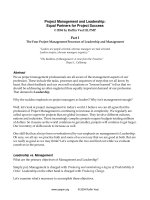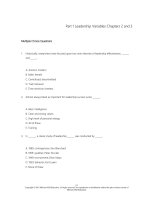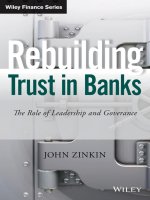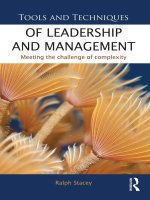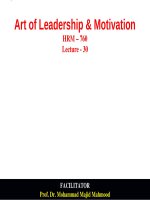Lecture Art of Leadership and Motivation - Lecture 24
Bạn đang xem bản rút gọn của tài liệu. Xem và tải ngay bản đầy đủ của tài liệu tại đây (1.66 MB, 34 trang )
Art of Leadership & Motivation
HRM – 760
Lecture 24
FACILITATOR
Prof. Dr. Mohammad Majid Mahmood
Developing Performance Driven
Organizations
2
Solution is HRD
3
HRD Definition
HRD is…
“the integrated use of training and
development, organization
development, and career
management to improve individual,
group, and organizational
effectiveness.”
(McLagan, 1989)
4
Competencies of HRD
Professionals
•
•
•
•
Leadership Skills
Interpersonal Skills
Global Mindset
Change Agent
5
Functions of HRD
• Training & Development
• Organizational Development
• Career Management
6
Training
• Training – improving the knowledge,
skills and attitudes of employees for
the short-term, particular to a specific
job or task – e.g., employee
orientation
7
When Should We Provide
Training?
•
•
•
•
New equipment, software
New tasks (job changed)
New regulations
Performance deficiency (gap)
8
Development
• Development – preparing for future
responsibilities, while increasing the
capacity to perform at a current job
9
TNA/SGA Techniques
Observation
Interviews
Questionnaires
Focus
Groups
10
Performance Problems
Major causes of performance problems:
Knowledge or Skills - The employee does not
know how to perform his responsibilities correctly lack of skills, knowledge, or abilities.
Motivation or Culture - The employee knows how
to perform, but does so incorrectly.
Process - The problem is not employee related, but
is caused by working conditions, etc.
Resources - Lack of resources (4 types).
DEAL WITH PROBLEMS
PROMPTLY
Otherwise:
• The poor performers can reasonably assume
their performance is acceptable
• Others may become demotivated and stressed
• The problem behaviour will become a habit
• A precedent may be set
• Your credibility may be damaged
Principles
to
Deliver
Training
Effectively
13
Principle 1 :
The Learning
Specialist
A learning specialist must
know the program, lesson,
subject, or skill to be taught.
14
Principle 2 :
The Learner
A learner must attend with
interest to the program,
lesson, or subject.
15
Principle 3 :
The Language
The language used as a medium
between the learning specialist and
the learner must be common to
both
16
Principle 4:
The Lesson
The information or skill to be
mastered must be explained.
17
Principle 5 :
The Learning Process
The learning process must
motivate learners.
18
Principle 6 :
Review and
Application
The evidence of individual development
must be reflected through a reviewing,
rethinking, reproduction, and applying of
the material, information, or skill that
has been communicated.
19
Training and Development Events
1 20
1 21
1 22
23
1 24
1 25
